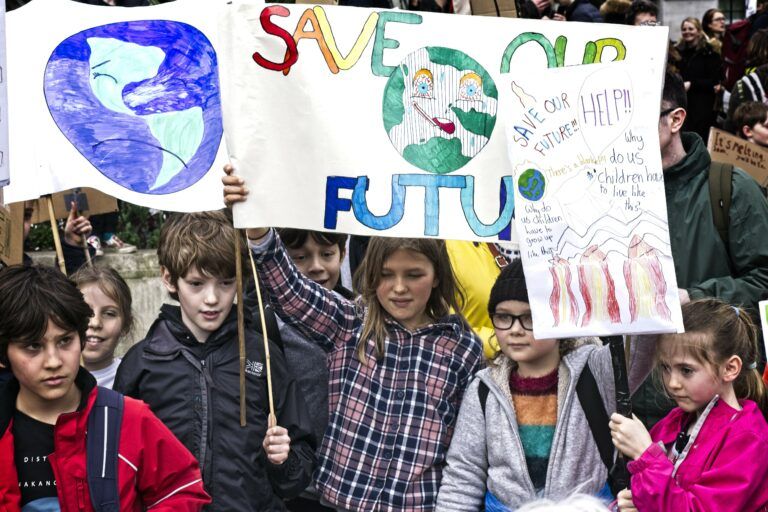In a historic victory for future generations, a court in Montana has held that state laws promoting fossil fuels violate the right to a clean and healthy environment under the Montana Constitution. The August 14 decision in the case, which was brought by Our Children’s Trust on behalf of sixteen Montana youths, specifically recognizes the state’s obligation to protect the environment for future generations.
“In holding that the government has an affirmative duty to protect the right to a clean and healthy environment, this decision is a big step towards ensuring a livable climate for future generations, and sets an important legal precedent,” said Linda Lakhdhir, Legal Director at Climate Rights International. “The court’s invalidation of this anti-science law should be a wake-up call to corporations and governments that business as usual is no longer an option.”
The plaintiffs in the case, who ranged in age from 18 to two years of age when the case was filed, challenged a provision of the Montana Environmental Policy Act (MEPA) which forbids the state and its agents from considering the impacts of greenhouse gas emissions or climate change in their environmental reviews.
Finding that the state’s actions in enacting and enforcing this limitation on review “exacerbates anthropogenic climate change and cause further harms to Montana’s environment and its citizens, especially its youth,” the court held that the limitation violates the Montana Constitution, which requires the state to “maintain and improve a clean and healthful environment in Montana for present and future generations.”
The plaintiffs also challenged a 2023 amendment to MEPA, passed by the Montana legislature during the pendency of the case, that precluded legal challenges to environmental reviews based on greenhouse gas emissions or impact on the climate. The court found this limitation in violation of the state’s constitutional obligation to provide adequate remedies to prevent depletion and degradation of natural resources.
“Governments and fossil fuel companies are on notice that laws and investment decisions that promote fossil fuels and ignore their impact on climate change will increasingly be subject to legal challenge,” said Lakhdhir.
The trial in the case ran from June 12-June 20, and included testimony from 10 of the plaintiffs’ expert witnesses as well as 12 of the 16 youth plaintiffs. Another youth-led case in Hawaii brought by Our Children’s Trust is due to go to trial in 2024. In this case the plaintiffs assert that, by continuing to operate a fossil fuel-dependent transportation system resulting in high levels of greenhouse gas emissions, the state is contributing to dangerous climate change and violating its constitutional obligations to protect Hawaii’s natural resources and to ensure the right to a clean and healthy environment for all citizens.
While the Montana decision is not binding on courts in other jurisdictions, it sets an important precedent for other courts in the U.S. and elsewhere as they consider similar constitutional or legislative provisions. Several other U.S states, including Hawaii, New York, and Pennsylvania, have constitutional provisions protecting the right to a healthy environment, and others have bills pending to create constitutional or legislative protections for such a right.
These moves are part of a growing global recognition that everyone has a right to a healthy environment, and that governments have an obligation to protect that right. The right to a healthy environment is protected under the Constitutions of more than 100 countries. For example, in response to a legal action filed in Colombia in 2018 by 25 children and youth claiming that deforestation in the Amazon and the increase of the average temperature in the country threatened their constitutional rights to a healthy environment, life, health, food, and water, the Colombian Supreme Court ordered the government to present an action plan to reduce deforestation in the Amazon region.
Intergovernmental bodies are increasingly calling for action. On September 27, 2022, the Council of Europe recommended that all member states “actively consider recognizing at the national level [the right to a clean, healthy and sustainable environment] as a human right that is important for the enjoyment of human rights and is related to others rights and existing international law.” In July 2022, the UN General Assembly (UNGA) adopted a non-binding resolution declaring access to a clean, healthy, and sustainable environment to be a universal human right. The resolution further affirms that “the promotion of the human right to a clean, healthy and sustainable environment requires the full implementation of the multilateral environmental agreements under the principles of international environmental law.” On March 23, 2023, the UN Human Rights Council adopted a resolution reaffirming the right to a healthy environment and calling on states to take steps to “respect, protect and fulfill” that right.
“The right to a healthy environment should be a top priority for governments everywhere as they respond to the devastating impacts of climate change,” said Lakhdhir. “Governments must abandon their short-sighted support of fossil fuels and act to protect future generations.”
Photo Credit: Young people demonstrate in support of climate action. Photo by Garry Knight via Flickr (CC0 1.0).







